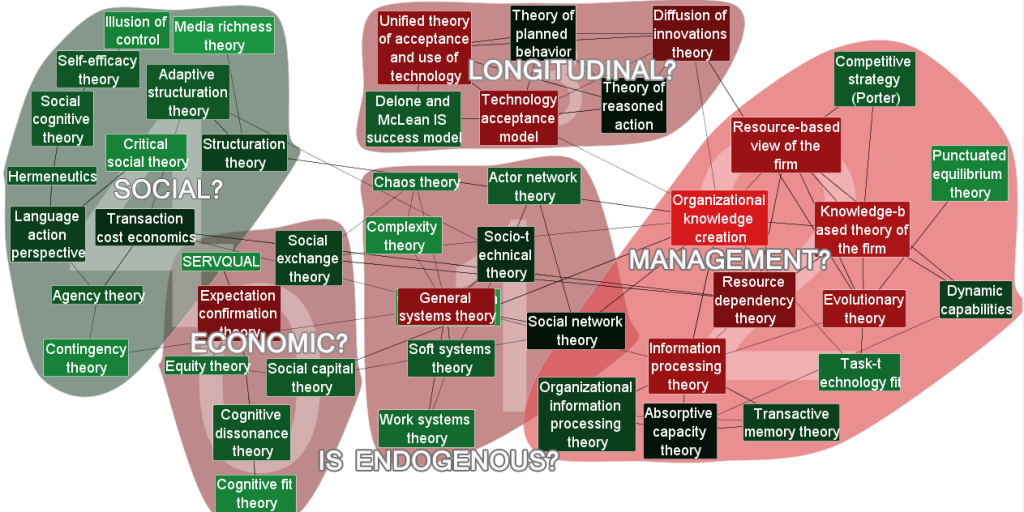I’ve been doing a bit of work to make sense of the range and scope of theories applied to understand and explain phenomena in information systems research.
Early on, I came across the IS Theories wiki, which provided a good starting point. Because the pages link related theories, I was able to generate a network graph using the Social Action software from the University of Maryland. Depending on your point of view, this either illustrates the fragmentation - or celebrates the diversity - of the IS field of study.

Applying the communities algorithm gave me a rough clustering of the theories (only as good as the relation definitions in the wiki, of course!). This seems to suggest approximate groupings of theories originating from social science, economics, IS itself (but with external influences), business / management and some that I have called longitudinal. The most strongly connected theory was that of “organisational knowledge creation”. Looking at the types of problem domain to which the theories have been applied, adaptive structuration was most widely applied by researchers in the papers quoted.
A number of papers discuss the heterogeneity of theory applied to information systems and either decry the apparent lack of coherent theoretical core or take the perspective that variety, dynamism and change come with the territory (Galliers,2004; Hirschheim & Klein, 2003; Larson & Levine, 2005). A systems approach based on critical realism is a recent attempt at inclusivity (Mora et al, 2007)
We had some discussion at ISDM on this, amongst a range of colleagues, many with a grounding in classic IS research of the 80’s and 90’s and some newer to the field. Experience aside, we differ quite a lot in our perspectives on this debate, with some tending toward practice-based research and some advocating a broader and higher view - and blaming the former for the lack of cohesion. Perhaps the debate has moved on somewhat now, from whether or not IS is in crisis, to admitting that it may not even be helpful to consider it as a field. A community of communities may be a better way to conceive it (Klein & Hirschheim, 2008). On that basis, we perhaps need to concentrate more on communication, community building and cross-disciplinary understanding.
References
Galliers, R. (2004). Change as crisis or growth? Toward a trans-disciplinary view of information systems as a field of study: A response to Benbasat and Zmud’s call for returning to the IT artifact. JAIS, 4(7), 337-351.
Hirschheim, R., & Klein, H. (2003). Crisis in the IS field? A critical reflection on the state of the discipline. JAIS, 4(10), 237-293.
IS Theories wiki: http://www.fsc.yorku.ca/york/istheory/wiki/index.php
Klein, H.K. and Hirschheim, R., 2008. The structure of the IS discipline reconsidered: Implications and reflections from a community of practice perspective. Inf.Organ., 18(4), pp. 280-302
Larson, T., & Levine, J. (2005). Searching for Management Information Systems: Coherence and Change in the Discipline. Information Systems Journal, 15, pp. 357-381.
Mora, M., Gelman, O., Forgionne, G., Petkov, D. and Cano, J., 2007. Integrating the Fragmented Pieces of IS research Paradigms and Frameworks: A systems Approach. Information Resources Management Journal, 20(2), pp.1-22., 20(2), pp. 1-22